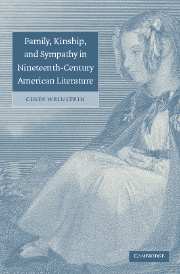Book contents
- Frontmatter
- Contents
- Acknowledgments
- Introduction
- 1 In loco parentis
- 2 “A sort of adopted daughter”: family relations in The Lamplighter
- 3 Thinking through sympathy: Kemble, Hentz, and Stowe
- 4 Behind the scenes of sentimental novels: Ida May and Twelve Years a Slave
- 5 Love American style: The Wide, Wide World
- 6 We are family, or Melville's Pierre
- Afterword
- Notes
- Select bibliography
- Index
- Cambridge Cultural Social Studies
2 - “A sort of adopted daughter”: family relations in The Lamplighter
Published online by Cambridge University Press: 22 September 2009
- Frontmatter
- Contents
- Acknowledgments
- Introduction
- 1 In loco parentis
- 2 “A sort of adopted daughter”: family relations in The Lamplighter
- 3 Thinking through sympathy: Kemble, Hentz, and Stowe
- 4 Behind the scenes of sentimental novels: Ida May and Twelve Years a Slave
- 5 Love American style: The Wide, Wide World
- 6 We are family, or Melville's Pierre
- Afterword
- Notes
- Select bibliography
- Index
- Cambridge Cultural Social Studies
Summary
The title of my chapter comes from a passage in Maria Cummins's The Lamplighter (1854) where the question of Gerty Flint's (or is her last name Grant, Graham, or Amory?) identity is raised. She is alternately Trueman Flint's “adopted child” or the child of True and Emily Graham who have “adopted her jointly.” She is both a “doubly-orphaned girl” (176), according to Mr. and Mrs. Arnold, and she is an “orphan child” of the “good foster-mother” (278) world. Exactly what it means to be an adopted child in Gerty's world, or to be doubly orphaned, is tantalizingly imprecise. The array of relational possibilities is quite stunning, whether from the parental perspective or the child's. This imprecision has significant consequences in terms of Gerty's development in the novel, most importantly in producing her capacity to dispense what I shall be calling “judicious sympathy”; that is, an ability not only to recognize and respond to the multiple claims people make upon her sympathy, but more importantly, to prioritize those claims and to mete out her sympathy accordingly. Gerty exercises her sympathy the way she goes about making her family – freely, rationally, and contractually.
Cummins's inconsistent vocabulary is, however, part of another story, and that is the development of what legal historian Michael Grossberg has called “the legal category of domestic relations,” specifically divorce and adoption, which was being formulated and debated during the historical moment of The Lamplighter and sentimental fictions more generally.
- Type
- Chapter
- Information
- Publisher: Cambridge University PressPrint publication year: 2004

